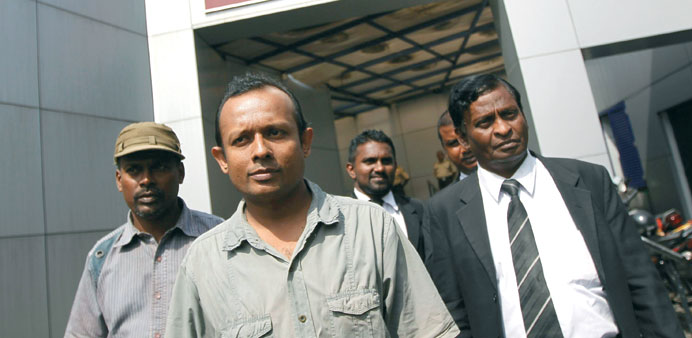Marxist leader Pubudu Jayakody (centre) leaves with his lawyers after handing a letter to the Human Rights Commission of Sri Lanka in Colombo yesterday.
AFP/Colombo
A mass grave found in Sri Lanka with over 150 skeletal remains dates back to a time when thousands of people disappeared during a crackdown on Marxist rebels, a forensics expert said yesterday.
Raj Somadeva said he had confirmed that the grave uncovered in the central district of Matale last November dated back to the late 1980s, the height of an insurgency by Sinhalese rebels.
“This grave cannot be older than 1986 and not newer than 1990,” said Somadeva, a professor of forensic archaeology at Kelaniya university.
Somadeva was commissioned by magistrates to write a report on the mass grave which was unearthed during construction work next to a hospital in Matale, 140km east of Colombo.
Police spokesman Buddhika Siriwardena said they were awaiting further reports on the cause of death and other details of the victims.
Authorities had initially said it was a burial site for those who died at the hospital during World War II. But the Marxist JVP, or People’s Liberation Front had maintained the victims were their members killed in the 1980s.
“The dating of the grave is crucial and it supports our claim that the victims had been killed during the uprising,” JVP lawmaker Anura Dissanayake told AFP. “We want this thoroughly probed and perpetrators brought to justice.”
Thousands of people disappeared during the JVP-led uprising between 1987 and 1990. Sri Lankan authorities have said that nearly 17,000 people were killed during the insurgency, a figure which includes rebels and their victims.
Government forces had crushed the rebellion by wiping out its entire political leadership by the end of 1989 and mopped up remaining activists by early 1990.
However, the JVP slowly re-emerged in 1994 and has since renounced its armed struggle and entered mainstream politics.
The insurgency by the mainly Sinhalese JVP was unrelated to the separatist campaign in the northeast by Tamil rebels. They were crushed by government forces in a no-holds-barred campaign which ended in May 2009.
Sri Lanka faces allegations of war crimes over the alleged killing of 40,000 civilians in the final stages of the Tamil war.
The country’s rights record has also been marred by charges of extra-judicial killings in the 1970s and 1980s.
Govt denies tampering with BBC broadcasts
Sri Lanka’s state broadcaster yesterday denied meddling with BBC programmes after the British Corp abruptly suspended FM radio feeds to the country, alleging ongoing interference.
The BBC had said on Tuesday that it was suspending its World Service FM broadcasts owing to “continued interruption and interference” in its Tamil programming, but the Sri Lanka Broadcasting Corporation denied any tampering.
“We have not jammed the programme or edited it,” chairman Hudson Samarasinghe told AFP. “They stopped the feed. They have not informed me why they did it.”
The BBC said its Tamil service was jammed on March 16, 17 and 18, prompting warnings to the Sri Lankan broadcaster that it was in breach of their agreement. After another disruption on Monday, the BBC suspended the service.
The BBC said that listeners in Sri Lanka could still access the BBC on shortwave and via its website.
The BBC suspended its FM programming in Sri Lanka in similar circumstances in February 2009, during the height of fighting between troops and Tamil Tiger rebels.
Sri Lanka lifted a state of emergency in 2011, but media rights groups say journalists have been forced to self-censor their work due to fear of attacks.

